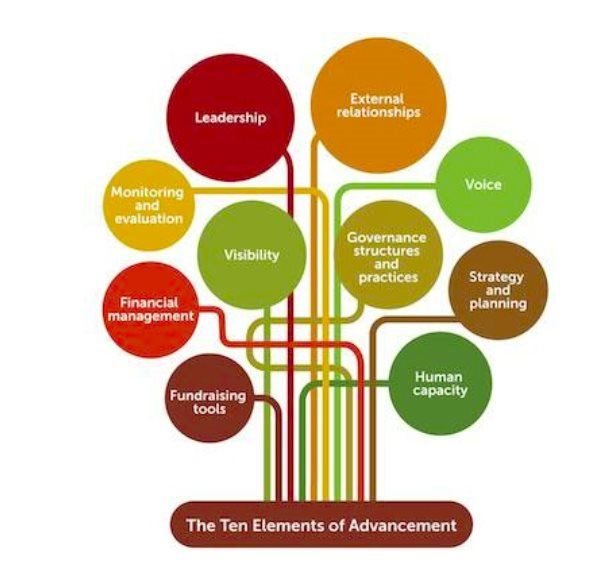Implementing advancement principles for long-term NPO sustainability
According to NPO Inyathelo, many non-profit organisations (NPOs) have been so busy dealing with immediate humanitarian needs during the Covid-19 pandemic, that they could - understandably - lose sight of some of the basic rules that will ensure their long-term sustainability.

Inyathelo finance director Soraya Joonas
Inyathelo teaches an integrated approach, known as advancement, to engage the external environment and position an organisation to attract support.
“If you are to provide long-term assistance for society, and employment for your staff, you should pay attention to the ten elements of advancement: leadership, governance, strategy and planning, financial management, fundraising, human capacity, relationship building, monitoring and evaluation, voice and visibility,” says Inyathelo finance director Soraya Joonas.
Joonas provides several practical examples of how to implement advancement principles:
Maintain communication: Websites and emails provide formal assurance that your organisation is making a contribution, while social media and personal calls offer reassurance. Continue to schedule regular updates with staff, board members, donors, volunteers and leaders of other NPOs. Remind people why your organisational mission is still relevant, and what leadership role your organisation is playing.
Get back to basics: While many staff may be busy at hospitals and shelters, administrative employees can focus on projects that one normally never seems to have time for. Getting your donor database updated is a good start, or create a risk register for your organisation outlining how risks can be mitigated as you navigate through the current crisis.
Explore the new: Encourage ongoing professional development by getting to grips with new technology and signing up for webinars and online learning. In fact, during this time, we have found that organisations are discovering in-house talent and untapped passion and skills that they weren’t necessarily aware of during the normal course of business. Explore funding channels that you have not tried before, such as crowdfunding.
Keep healthy: With many working from home, working hours are not necessarily confined to usual normal working hours. It can be typical in unpredictable crisis periods that employees work more hours than they normally would. Encourage staff to take care of themselves at this time.
Now that there is more flexibility around exercise, encourage staff to catch up on and maintain their physical fitness. Be attentive and empathetic to employees who live alone or might be handling undue strain during the lockdown. Don’t pretend that it’s business as usual. Find out how people are doing and guide them to the appropriate support. Ensure they get medical care if needed.

Reach out: If your own organisation is hurting, speak out about the hardships that you are experiencing. Some organisations are faced with a drop in individual donations that are being redirected to the Solidarity Fund. Tell your supporters what you need, whether it is help with the rent, or funding for data and technology.
Financial health: Reach out to your existing donors about building some flexibility into your existing grants to help your organisation through this difficult period. Know your financial status by forecasting your cashflow and engage in scenario planning over the next three, six and nine months.
Revisit your budgets and cut where necessary while engaging your board on key decisions and support. Make use of financial relief offered by the Department of Labour through Covid-TERS support or PAYE payment relief to ease cashflow strain. Above all, continue to maintain systems of financial control and move forward with planned audits that will strengthen the governance of your organisation.
Share good news: Fred Rogers, a pioneer of children’s television and education, said that when he was a boy and saw frightening things on the news, the advice his mother gave him was to “look for the helpers. You will always find people who are helping”, when tragedy strikes.
There are plenty of examples of how ordinary South Africans are making a difference during the pandemic. Locally, citizens have made and donated hundreds and thousands of meals and food parcels, hotels and guest houses have offered accommodation to healthcare workers, businesses have provided everything from masks and sanitisers to space for testing stations, and artists have offered work for auction.
Focus on the details: Share triumphs by embedding audio and visual elements into your communications and donor appeals so that people are uplifted by and relate to heart-warming stories. Donors appreciate knowing exactly where their money goes. Show where their rands are being spent, even if you just focus on one area of your work whereby people are being supported through the Covid-19 crisis.
“There have been so many tragic stories related to this dreadful pandemic, but it has also revealed how non-profits and ordinary individuals are making an incredible difference,” says Joonas. “As we sadly hear of NPOs closing their doors, more than ever, NPOs need to keep focused on fundamental rules of survival so that they can sustain themselves and be in a position to continue making a contribution where it is most needed.”
